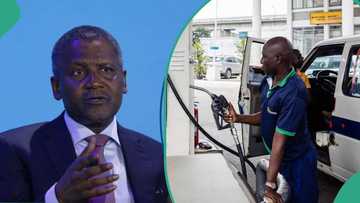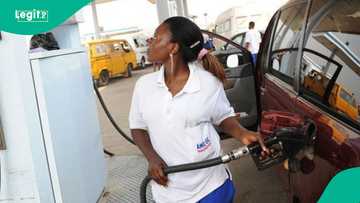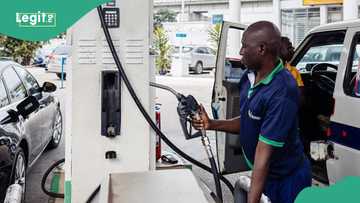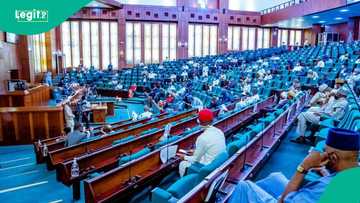Marketers Warn of Dangote’s Monopoly in Oil Industry Ahead of Fuel Distribution Plans
- Oil industry stakeholders have expressed concerns that Dangote Refinery's control over the market could lead to fuel shortages, job losses, and the closure of significant facilities nationwide
- NOGASA President Bennett Korie urged the government to intervene and prevent monopolies in the oil industry, similar to the cement industry, where a single entity sets the price
- PETROAN President Billy Gillis-Harry also warned that Nigerians may not fully understand the consequences of Dangote's distribution venture until it is too late
Legit.ng journalist Zainab Iwayemi has 5-year-experience covering the Economy, Technology, and Capital Market.
Oil industry stakeholders have blasted Dangote Refinery for controlling the market, claiming that it will not only result in a shortage of fuel but also lead to job losses and the closure of significant facilities nationwide.

Source: Getty Images
This was the opinion expressed during the Natural Oil and Gas Suppliers Association of Nigeria's (NOGASA) 2nd Annual General Meeting, which took place at the Chida Hotel in Abuja on Thursday.
The warning came two weeks before the Dangote Refinery began distributing petroleum goods nationwide to reduce transportation issues and lower the cost of petroleum products, particularly fuel and diesel.
According to the Nigerian Tribune, the Dangote Petroleum Refinery declared in June that it had spent N720 billion on 4,000 trucks that run on compressed natural gas (CNG) for the transportation of petroleum products around the country. The company claims that it is part of its plan to deliver fuel directly to gas stations, factories, and other large users, avoiding traditional depots and intermediaries. The program is set to start on August 15 and is anticipated to save Nigerians more than N1.7 trillion a year.
Marketers react
However, Tribune reported that during his remarks at the event, NOGASA President Bennett Korie stated that Dangote's refusal to participate in or permit its members to be a part of the distribution chain is a clear and red flag that Dangote will control the entire industry as the only refiner, distributor, and retailer. This could eventually result in fuel shortages, job losses, and the closure of members’ outlets throughout Nigeria.
Korie stated that they were not opposed to Dangote's success, but that things needed to be viewed in the right light. They also urged President Bola Tinubu to step in and stop monopolies in the oil industry, similar to the cement industry, where a single person sets the price.
“If you have 1,000 staff working with you, here, we have 3,000 workers. We have 4,000 Nigerians benefiting from this business. But when you ask the remaining 3,000 people to go home, you have only 1,000, and maybe you have foreigners working there, we don’t know, this will affect the whole system.”
He added, “Some people will be thinking maybe because we don’t want him to do this or because of competition, but no, we don’t want what happened to NNPC to happen to Dangote Refinery. The reason is, before now, NNPC refined products and distributed their products through KPMC.”
“At that time, everything was moving smoothly, until people that advised Dangote today went to advise NNPC to start doing distribution directly, which is why we have filling stations in NNPC stations. As soon as these NNPC filling stations started, that is when our refinery started going down. Because they were concentrating on their filling stations, and not on the refineries.”
“I’m not saying they are not paying attention to refineries, but you can’t do it alone. You are blending at the same time transporting, and adding filling stations into your operation. We need to call the attention of the government to intervene by telling them that if you only distribute products, there would be serious scarcity. Imagine if all of us said, ‘Do it alone now, no problem.’ I close my station, everybody closes their business, and he does it alone. How will he provide products for everybody?”
Billy Gillis-Harry, the national president of the Petroleum Products Retail Outlet Owners Association of Nigeria (PETROAN), echoed Korie's opinion by stating that Nigerians will not understand the significance of Dangote's product distribution venture until after the damage has been done and it is too late. He drew Nigerians' attention to the beginnings of Dangote's cement distribution network and the consequences that people are currently facing.
“I want to draw your attention to the fact that we also have similar situations in our cement industry, where you are seeing the same trucks supplying cement to those small container shops that sell cement. Since when the cement is produced from the same factory and distributed to those very critical distribution centers, have you bought cement for N115 again? We are buying it now for over N10,000. So, don’t be deceived that there is good news, because somebody is bleeding for this, and there will be a price to pay for it.”
“With a production capacity of 650,000 barrels per day, which has now increased to 700,000 barrels, PETROAN simply argues that Dangote refineries should be competing with global refineries, not operating as a distributor in the downstream. We have NOGASA that’s more than capable of doing it. We have NARTO that’s able to do it,” Gillis-Harry stated.
Oil marketers import petrol
Legit.ng reported that Nigeria’s downstream oil sector is witnessing renewed competition as major oil marketers resume increased importation of Premium Motor Spirit (Petrol).
The development sets the stage for a fresh round of price competition, potentially driving lower pump prices for consumers nationwide.
Several marketers have opted to source petrol from international suppliers following a drop in crude oil prices.
Source: Legit.ng







